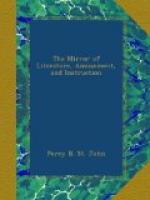(From a Correspondent.)
This is performed with great ceremony and mystery, on Christmas Eve, by the elders of the family, without the knowledge of the younger members. They deck a large evergreen with presents of various kinds: to toys, bonbons, and such trifles, are added things of more value and use—working materials for the girls, knives, &c. for the boys, and books of amusement and instruction for both. Little tapers are attached to the branches of the shrub; and at break of day the children are roused from their slumber, and when all are ready (for no one is allowed to enter singly) they are admitted into the room, where the illuminated tree greets their eyes. Great is the anxiety of the young party to see who has been provided for, since the idea they are taught to entertain is, that these tempting objects are bestowed by an invisible agent, as a reward for good children, and that the naughty and ill-conducted will find no share allotted to them.
Hebel, in one of his pretty, simple poems, describes a mother sitting by her sleeping child, as she prepares its morning surprise. She enumerates the various gifts she hangs on the tree, pausing in her pleasing task as a moral reflection is suggested by any of the objects she has collected, and concluding by a prayer for the future welfare of her darling. Would not the Christmas-tree be a pleasant addition to our juvenile amusements? The Twelfth-night King and Queen might plant such a one in their royal domain, and graciously conclude their merry reign by distributing amongst those who have served them as liege subjects for the evening, the motley fruits that grace it. Each should be previously marked to correspond with the character to be drawn, which would secure a token of their majesties’ favour for each individual of the sportive train.
* * * * *
SPIRIT OF THE PUBLIC JOURNALS.
* * * * *
ST. JOHN LONG
Has distanced the majesty of British justice in the persons of the coroner, the bailiffs, and the Bow-street magistrates, after all. We knew that he would do so; but in this we take no possible credit to ourselves, for every one knew that he would do so. Public opinion is, we must confess, still divided as to the place of his retreat, some pronouncing it America, where his purpose is, to set up a bank with Rowland Stephenson; others, New South Wales, by a natural and pleasant anticipation; and others, Paris, which of late years has superseded Philadelphia, and even New York, as the general receptacle of “the unfortunate brave,” the asylum of those men of genius, who have too much talent to live in England, the favoured spot of regeneration for those brilliant speculators whose conceptions equally outrun their credit and their age. However, the majority are clearly for Paris; and the objects of the visit are said to be




